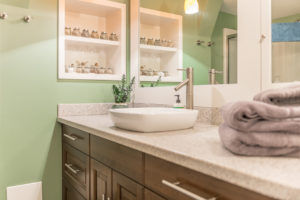The City of Portland and Airbnb worked very hard this year to pass a set of guidelines that would allow hosts to operate legally in the city. Prior to 2014, it was technically illegal in Portland to offer rooms for rent for less than 30 days. Hosts doing so risked being shut down by a complaint to the city from a neighbor. Now, once the $178 permit has been granted, hosts are protected from complaints as long as they remain in compliance with the city code requirements.
Permit period and renewals
These Accessory Short-Term Rental (ASTR) permits are valid for 2 years after which hosts must self-renew with personal attestations of safety and additional filing fees every 2 years for up to 6 years after which time the property must be re-inspected by the city.
Head and room count
The Type A ASTR permit limits the number of bedrooms that can be rented to overnight guests to 2 no matter if there is a fully-permitted Accessory Dwelling Unit (ADU) in the home or not. The code goes further to limit the total number of residents in the building to no more than the family members who live in the home plus 5 additional people. For many homeowner couples, this means a maximum of 7 people in the home at any given time.
Activity restriction
In addition to the number of residents in a building, ASTR codes also restrict the types of activities that can take place in the home.
For instance, commercial meetings like luncheons, parties, weddings, fundraising events, or other gatherings for which direct or indirect compensation could be expected are not allowed on the property. Home businesses which allow nonresident employees or up to 8 visitors per day to the business are also prohibited from operating in a Type A ASTR. Hiring employees specifically to prepare food or serve beverages to guests is a no-no, too.
On the other hand, home occupation businesses where no employees or customers visit onsite are allowed as is regular home maintenance services like landscaping and house cleaning are acceptable. If so inclined, hosts may also continue to serve alcohol and food to guests in their home.
If you got it, flaunt it (your permit number, that is)
Once inspection has been completed and a permit number issued, it must be included in all advertising and posted within the unit. Any signage should be regulated by the Sign Code Title 32 as is standard with other Portland businesses.
Register the “business”, forget the room tax
The Airbnb property and newly-minted ASTR must register with City of Portland Revenue Bureau as a business which costs $100 and collect and remit transient lodging taxes. Luckily for Airbnb hosts, its booking system has a method to collect and hold taxes for relevant bookings and release payments to the city automagically without further action from the host. Nice, right?
Start a glog (guest logbook)
Once inspection has been finalized, hosts must begin to track guest information in a written logbook. This logbook should include information like:
- guest name
- home address
- car license plate number
- dates of their stay
- the room they stayed in
This diary of guest stays should be available for city officials to review immediately upon request.
Residency requirements
The city’s code does not support absentee landlords but rather encourages sharing unused space in a home where the resident must physically reside for at least 9 months out of every year. Even so, it also allows for an Operator who will care for the unit, cleaning and maintaining it while ensuring a positive guest experience while hosts are away.
We can help
Passing the permitting process is one of the most important tasks a Portland host will have to undertake in order to avoid penalties, fines, and being shut-down for non-compliance. Let Turnkeyed help you successfully navigate the permitting system with ease by contacting us.








Leave a Reply